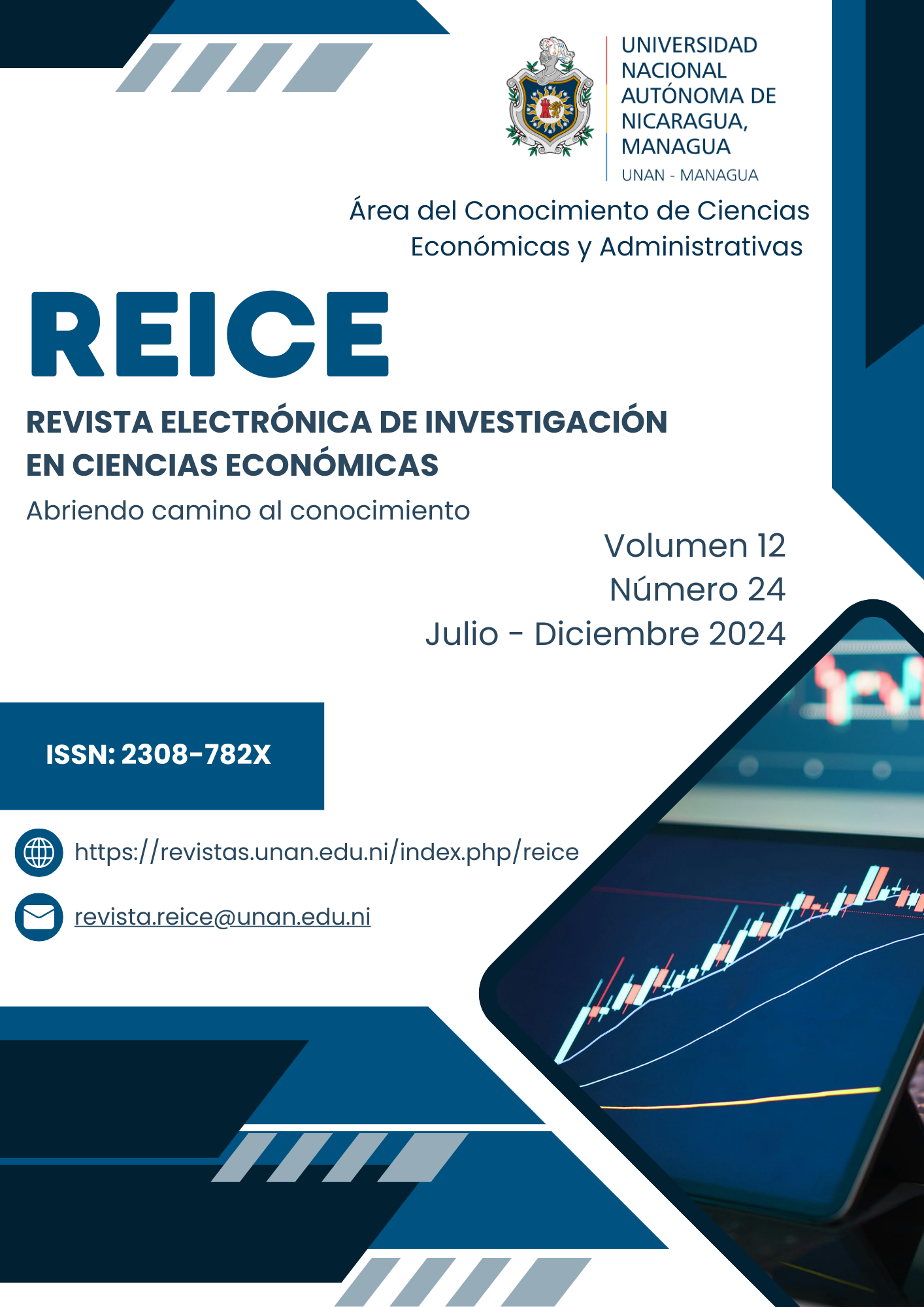Risks to Sustainable Economic Development in Russia Under Sanction-Induced Import Restrictions: A Regional and Sectoral Perspective
DOI:
https://doi.org/10.5377/reice.v12i24.20091Keywords:
Import substitution, intersectoral balance, types of economic activities, manufacturing industry, economic development sustainabilityAbstract
The purpose of the article was to analyze the direct and indirect dependencies of Russia's economic sectors on imports of intermediate and final consumption. The methodological foundation of the study is the construction of an intersectoral balance through the creation and subsequent analysis of "input-output" tables. The statistical data were collected from Rosstat for the period from 2012 to 2020. The object of the study is the Russian Federation. Based on the evaluations carried out, the most critical areas have been identified that determine the dependency of the Russian national economy on the import of intermediate and final products within the system of economic activity organization for the major types of economic activities. An important result of the work is the assessment of import dependency across individual sectors of the manufacturing industry.
Downloads
References
Assessment of Russia's Dependency on Imports of Intermediate Products. (2023). Central Bank of the Russian Federation. Retrieved from: https://cbr.ru/content/document/file/144138/wp_106.pdf
Bali, M., Rapelanoro, N. (2021). How to simulate international economic sanctions: A multipurpose index modelling illustrated with EU sanctions against Russia. International Economics, 168, 25-39. https://doi.org/10.1016/j.inteco.2021.06.004
Bershka, M., Lee, R. (2022). How does import market power matter for trade agreements? Journal of International Economics, 137. https://doi.org/10.1016/j.jinteco.2022.103580
Carfora, A., Pansini, R.V., Scandurra, G. (2022). Energy dependence, renewable energy generation and import demand: Are EU countries resilient? Renewable Energy, 195, 1262-1274. https://doi.org/10.1016/j.renene.2022.06.098
Elshin, L.A., Burganov, R.T., Abdukaeva, A.A. (2021). Formalizovannaya otsenka chuvstvitelnosti sektorov ekonomiki k ispolzovaniyu blokcheyn-tekhnologiy (na primere Rossiyskoy Federatsii) [Formalized assessment of the economic sectors sensitivity to blockchain technologies (on the example of the Russian Federation)]. Kreativnaya ekonomika, 15(4), 1155-1172. https://doi.org/10.18334/ce.15.4.112002.
Irwin, D.A. (2021). The rise and fall of import substitution. World Development, 139, 105306. https://doi.org/10.1016/j.worlddev.2020.105306
Ismagilova, L.R. (2004). Development of Export-Oriented and Import-Substituting Industries as a Factor of Regional Integration into the Global Economy: Dissertation. Kazan. Retrieved from: http://www.dissercat.com/content/razvitieeksportoorientirovannykh-i-importozameshchayushchikh-proizvodstv-kak-faktor-integra
Kadochnikov, P. A. (2005). The Impact of Import Substitution on Economic Growth Processes in a Transition Economy: Dissertation. Moscow. Retrieved from: http://economy-lib.com/vliyanie-importozamescheniya-na-protsessy-ekonomicheskogo-rosta-v-perehodnoyekonomike
Karuppiah, K., & Sankaranarayanan, B. (2023). An integrated multi-criteria decision-making approach for evaluating e-waste mitigation strategies. Applied Soft Computing, 144. https://doi.org/10.1016/j.asoc.2023.110420
Kaznacheev, P. (2015). On the Illusions of Import Substitution. What Does the Self-Isolation of an Oil Economy Lead To? Mneniya. Retrieved from: https://republic.ru/posts/52426
Kireev, A.P. (1997). International Economics: International Microeconomics: The Movement of Goods and Factors of Production. Moscow: International Relations.
Krugman, P., Obstfeld, M., & Melitz, M. (2018). International Economics: Theory and Policy, Global Edition. International Economics: Theory and Policy, Global Edition (p. 803). Pearson Education, Limited.
Leibovici, F., Waugh, M.E. (2019). International trade and intertemporal substitution. Journal of International Economics, 117, 158-174. https://doi.org/10.1016/j.jinteco.2018.11.007
Leontiev V. (1990). Economic Essays. Theories, Research, Facts, and Policies. Moscow: Politizdat.
List, F. (1891). The National System of Political Economy. St. Petersburg: A. E. Martens Publishing.
Lukyanchuk, E. (2011). Import Substitution: Foreign Experience. Apteka, 15(786), 237-241.
Mironova, O.A. (2015). Import Substitution: Foreign Experience and Lessons for Russia. Mezhdunarodnyj nauchno-issledovatel'skij zhurnal, 7(38). Retrieved from: http://research-journal.org/economical/importozameshhenie-zarubezhnyj-opyt-i-uroki-dlya-rossii
National Accounts. (n.d.). Federal State Statistics Service. Retrieved from: https://rosstat.gov.ru/statistics/accounts
Prebisch, R. (1992). Peripheral Capitalism: Is There an Alternative? Moscow: Institute of Latin America, Russian Academy of Sciences.
Reference and Analytical Materials. (n.d.). Federal Customs Service. Retrieved from: https://customs.gov.ru/statistic
Safiullin, M.R., Gafarov, M.R., Elshin, L.A. (2022). Importozameschenie kak instrument obespecheniya ustoychivogo razvitiya ekonomiki v usloviyakh sistemnyh preobrazovaniy: regionalno-otraslevoy aspekt [Import substitution as a tool for ensuring sustainable economic development amidst systemic transformations: regional and sectoral aspect]. Ekonomicheskie otnosheniya, 12(3), 407-432. https://doi.org/10.18334/eo.12.3.115210
Zaitsev, D. N. (2002). Organization of Import-Substituting Production as a Direction of Regional Economic Development: Dissertation. Orenburg. Retrieved from: http://www.dslib.net/economika-xoziajstva/organizacija-proizvodstva-importozamewajuwej-produkcii-kak-napravlenie.html
Downloads
Published
Issue
Section
License
Copyright (c) 2024 Revista Electrónica de Investigación en Ciencias Económicas

This work is licensed under a Creative Commons Attribution-NonCommercial-ShareAlike 4.0 International License.

